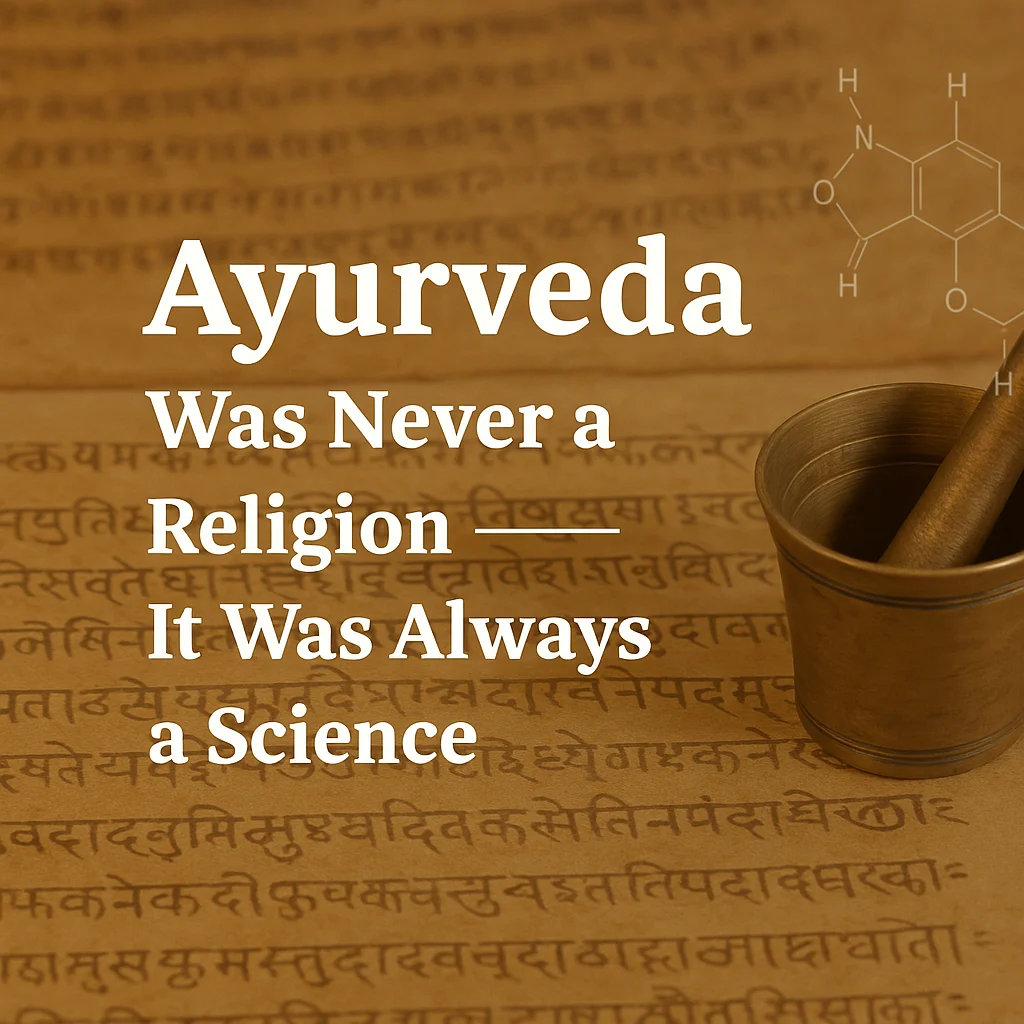What I Found While Reading the Classics: Ayurveda Was Never a Religion — It Was Always a Science
As someone deeply involved in Ayurveda is a science not a religion, both philosophically and professionally, I often come across debates — some defend Ayurveda without nuance, while others dismiss it as blind faith or superstition. Somewhere between these two extremes, the essence of this ancient science gets lost.
Recently, as I revisited the classical Ayurvedic texts — Charaka Samhita, Sushruta Samhita, Ashtanga Hridaya — I found myself looking at them with a fresh perspective. And what I discovered reaffirmed what many in the field may feel, but seldom articulate boldly:
Ayurveda was never born out of religious morality. It was crafted from observation, ecology, and logic — a science of life that predates dogma.
Meat in the Manuals: A Surprising Discovery
One of the most eye-opening aspects was Ayurveda’s approach to diet — particularly the inclusion of meat. These texts didn’t just mention meat in passing — they classified it meticulously (Mamsa-varga):
• Aquatic animals (Audaka)
• Wild animals (Vana Mamsa)
• Birds (Pratuda)
• Domestic animals (Gramya)
And so on.
The classifications weren’t based on what was spiritually pure or impure, but on the effect each type had on the doshas, digestion, tissue regeneration, and recovery. The inclusion or exclusion was strictly therapeutic, not religious.
To me, this was powerful evidence that Ayurveda’s foundation was never moralistic — it was diagnostic, adaptable, and practical.
Science in Every Sentence
The more I read, the more I realized that Ayurveda operates as a systems-based science — one that looks at the body not in parts, but in patterns. Ayurveda is a science not a religion.
It emphasizes:
• Personalization through prakriti (constitution)
• Balance and feedback loops via agni, doshas, and dhatus
• Preventive lifestyle based on seasons, age, and geography
• Mental health frameworks long before modern psychology emerged
This is not the language of rituals. This is the language of clinical reasoning and long-term biological insight.
Let’s Be Clear: Ayurveda Is Being Misrepresented
Let me also say this clearly: Let Ayurveda not be misconstrued by the weird proclamations of self-acclaimed, non-scientific persons. Unfortunately, such misrepresentations — often made without any classical reference or training — invite ridicule from modern skeptics.
Not because Ayurveda is flawed. But because its spokespeople are sometimes louder than its scholars.
If we want rational minds to engage with Ayurveda, we must present it in its original scientific depth, not diluted forms meant to entertain or sensationalize.
Where the Disconnect Comes From
The misconception that Ayurveda is religious likely stems from later socio-political overlays — caste-influenced reforms, colonial skepticism, and the gradual blending of moral codes with medical ones.
But what I saw in the original texts was something else: a system that was pluralistic, grounded, and remarkably progressive for its time. It didn’t tell people what to believe — it guided them on how to live in tune with their nature and environment.
Time to Reclaim the Narrative
Ayurveda doesn’t need defending. It needs re-articulation.
It is not a lifestyle cult.
It is not a religious doctrine.
It is India’s original health science — developed with intention, refined through observation, and structured to treat, not preach.
And yes, it is ready for evidence-building. But let us not mistake modern formats as the only path to truth.
My Final Thought
As I closed the books and reflected on what I had just read, I was filled with a quiet conviction:
If the world is rediscovering Ayurveda now, it must be shown in its truest form — not as a relic, but as a rational, living science. One that included meat, managed madness, balanced hormones, and treated the body as a microcosm of nature.
If that isn’t scientific, what is?
Arun Srivastava
Founder & CEO,










 Know your Dosha
Know your Dosha